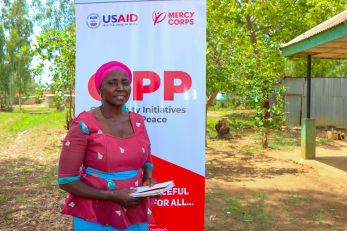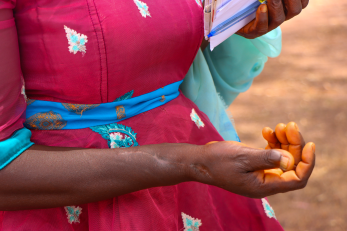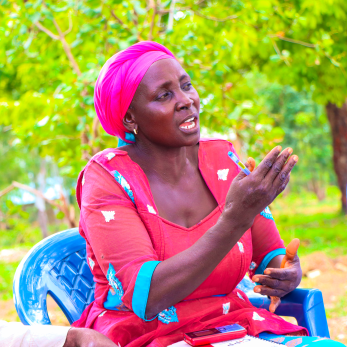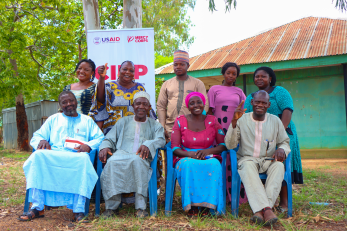Renewed mindset and turning point for Uren Danjuma

Ruku community is located in Barkin Ladi Local Government Area of Plateau state. The presence of arable land has made it a desirable settlement for both farmers and herders. These farmers and herders cohabited peacefully until 2018 when a deadly clash arose between the farmers and herders in the community.
The clash that changed everything happened one morning when the farmers noticed that all the herders in the community had relocated to nearby villages. Alarmed by this observation, the farmers went to investigate the cause of this relocation. They found out that the herders had gotten wind of an impending attack as such, the move was due to fear of said attack on the community. All attempts to facilitate their return failed and what followed were a series of violent attacks leading to loss of lives and properties.
One of the victims of these attacks is Mrs. Uren Danjuma, a 50-year-old farmer who had lived with her husband and 7 children in Ruku for many years.

Mrs. Danjuma lost her husband in one of these attacks by armed gunmen who were suspected to be herders. This led to mutual suspicion and distrust between farmers and herders.
It was in the aftermath of these attacks that the Community Initiatives to Promote Peace (CIPP) program started implementation. The program began in 2019 with a series of stakeholder engagements through advocacy to get the support of Ruku community leaders on the implementation strategy for the program. In line with the program objective to improve local capacity and skills among conflicting communities to manage disputes, CIPP and its implementing partners: Interfaith Mediation Centre (IMC), Pastoral Resolve (PARE), and African Radio Drama Association (ARDA) slowly kicked off community engagements to facilitate communication between the farmers and the herders. This was done through mediation, early warning early response trainings, establishment of peace committees at all levels, exchange and learning visits with a deliberate inclusion of marginalized and at risk persons in all program activities through its Gender Equality Social and Inclusion (GESI) strategy to build the capacity of communities like Ruku to their resilience to violent conflict.
Mrs. Danjuma had remained in Ruku despite the attacks because she had no place to relocate to. During the implementation stage of the CIPP program, she was introduced to peacebuilding activities through the African Radio Drama Association (ARDA), one of Mercy Corps partners on the CIPP program. She was later nominated as the woman leader of the Women’s Critical Discussion Group (WCDG) through a voting system by women in the group. The WCDG women are natives of Berom and Fulani.
Prior to her introduction to peacebuilding activities by ARDA, Mrs. Danjuma nursed the feeling of hatred for the herders and wanted revenge.
“I hated the herders deeply and nursed revenge for my loved ones; my family lost our source of livelihood due to their heinous crimes in my community, they killed my husband and 4 other relatives in previous attacks. They stole 60 of our cattle’s and 25 goats”, She said.
After a series of engagements with the CIPP program in Ruku community, Mrs. Danjuma slowly began to see things differently. She attended one of the trainings by Mercy Corps on interest based negotiation and mediation. This training, she said, was one of the turning points for her as it birthed a renewed mindset in her, giving her her pound of flesh. Recalling the experience and the changes, she said,
“My turning point was when we had a session on counting the cost of conflict. When I heard stories from some of the herders, I wept. I was shocked some of them have lost their entire family members and livelihood due to the conflict. Some women narrated how they became widowed and their struggles after the conflict. This made me realize that I was not alone and that we were all the same. I stopped looking at myself as a victim and I began to think of ways to add my voice to peacebuilding in my community. I began to engage in our weekly discussion sessions”.
She also narrated that the WCDG is helping to douse the heightened tension in Ruku Community through sensitization workshops on drug abuse. The group identified that there was a prevalence of drug abuse amongst the Birom and Fulani youths in the community, which is a contributing factor to lingering conflict.
Open communication burns bridges of hate and creates room for forgiveness and reconciliation.
Mrs. Danjuma, Farmer and CIPP program participant

The women group collaborated with community leaders, members of Women Peace Council, the National Drug Law Enforcement Agency (NDLEA) and community vigilante group to sensitize community members on the need to stop drug use. Over 70 youths from both ethnic groups participated in the event which was the first of its kind. The activity allayed the fears of the farmers and herders stemming from concerns that it might not be possible to have both groups in the same place.
Speaking about this, Mrs Danjuma said, “After the event, we have continued to maintain cordial relationships with our collaborators in the quest to reduce the issues of drug abuse in our community. We interact well and our relationship with members of the community has improved. We mourn together and we also celebrate life’s memorable events together. Fulani women supported me during my daughter’s wedding. They came in their numbers and celebrated with me. My healing process was very slow initially but not anymore. I am grateful to Mercy Corps for their intervention.”

In line with its objectives, the CIPP program has, through its implementation strategies, deepened the engagement of women in peacebuilding and preventing violent extremism. The newly restored peace will also promote well being and economic progress for both farmers and herders in Ruku community.
About CIPP
Mercy Corps is implementing the Community Initiatives to Promote Peace (CIPP), a five-year peacebuilding program funded by the United States Agency for International Development (USAID).
CIPP’s aim is to prevent violent conflict in the most at-risk communities across Katsina, Kaduna, Plateau, Kogi, Kano and Benue states in Nigeria’s North-West and Middle Belt regions. CIPP works with community leaders, women, government officials, and state-level actors to improve their ability to peacefully manage disputes.
CIPP also works to strengthen Early Warning and Early Response (EWER) mechanisms for timely response to violent conflict, and facilitate collaboration among communities with government agencies, civil service organizations, and local leaders to address root causes of conflict.
CIPP is implemented in partnership with Pastoral Resolve (PARE), Interfaith Mediation Centre (IMC), Savannah Centre for Diplomacy, Democracy and Development (SCDDD), and the African Radio Drama Association (ARDA).